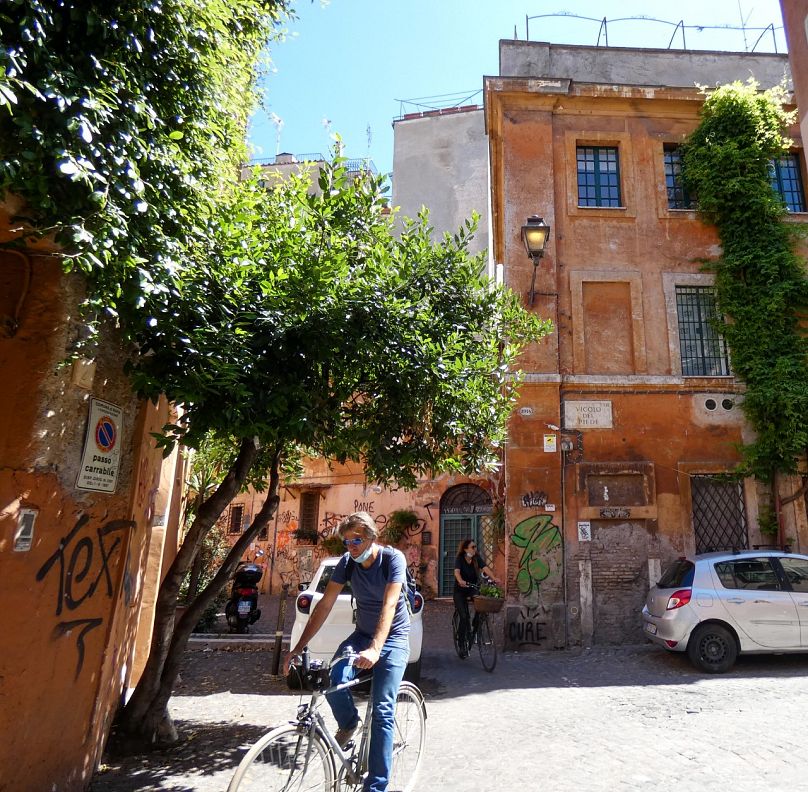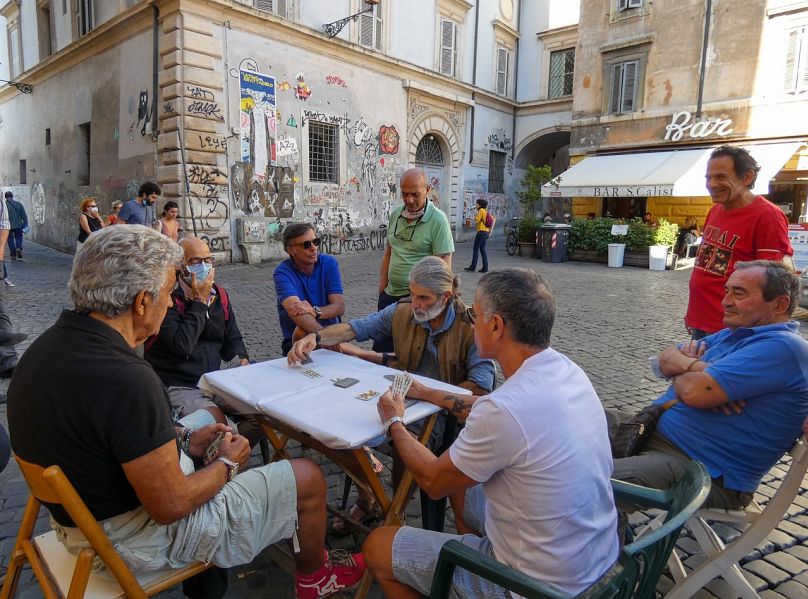For years the Italian capital economy has relied on tourism - a sector eviscerated by the coronavirus pandemic. Some locals in Trastevere think it’s time for a rethink.
On the streets of Rome, seagulls seem to haven taken center stage. Walking through the alleys of Trastevere, the historical district of the capital, it’s easy to notice an unusual silence dwelling.
Rome is one of the most popular destinations for tourists. Nevertheless, some small businesses still have their shutters drawn, and one in two houses is now empty, waiting for a visitor that this summer is unlikely to arrive. According to Enit, the Italian national agency for tourism, Rome is set to see a 44% drop in tourism this year. One of the most affected districts is Trastevere.
Italy reopened its borders to the Schengen area countries on 3 June. But the recovery is expected to be slow: according to Enit, tourist numbers are expected to return to its 2019 rate only by 2023.
“Normally, in the old town of Rome more than 15,000 houses are rented out to tourists during the year, and 10,000 of them are whole houses” housing expert Sarah Gainsforth told Euronews. “It means that in a small neighborhood like Trastevere, the ratio is two local residents to one tourist” Gainsforth added.
Now that Covid19 has put tourism in quarantine, Trastevere realizes that the economic machine that has been bringing wealth so far, is revealing its weaknesses.
“Rome hasn’t been adopting a long-term strategy so as to diversify its economy. The city relies too much on tourism industry, which revealed itself vulnerable and quite often unsustainable” Gainsforth pointed out.
Business owners tackling the crisis in the travel sector are adopting different strategies: some try to rent their apartments on the local market while others simply decide not to reopen their stores.
Roberta D’Onofrio lives in Trastevere and she is an Airbnb host. Like many other hosts, she ended up with empty apartments due to the pandemic. For this reason, she founded the site “Bnb working spaces” and converted holiday homes into smart working places.
“I knew smart workers would have needed alternative places to work and I said to myself: ‘let’s try to combine this new demand with holiday rentals’” D’Onofrio explained.
The name “Trastevere” comes from the latin “trans Tiberim”, meaning "beyond the Tiber". True remaining Romans who used to live in the district have been progressively moving away in the last thirty years, in search of a more comfortable setting. Today, the last residents are struggling in the attempt to remain against the growing business of tourism.
“In the last twenty years, flats within historical buildings have been converted into short rent apartments, while food and beverage stores replaced traditional shops” Gianfranco Caldarelli, member of the local neighbourhood association “Trastevere attiva”, told Euronews. “The community has lost shops we won’t see anymore: those mending t-shirts and socks or the butchers who rode the whole city in order to get the best of meat for their customers” Caldarelli recalled.
Nowadays Trastevere maintains some of its identity and beauty, thanks to its cobbled streets lined by ancient houses, wonderful fountains and restaurants framed by vines.
Walking through its narrow alleys, it is still possible to come across to “trasteverini”, as the original local residents love to define themselves. Every afternoon, they gather in piazza San Callisto and play cards; except when the wind blows their cards away. If so, they just sit on their chairs, chilling out, looking around, and making jokes.
“Everyone knew each other in Trastevere, it was a sort of small, independent town within the city: people used to leave their doors open” Susy Porcelli told Euronews. Porcelli’s grandfather was a carter, he transported wine, distributing it to businesses. Then, in 1935 he set up his own tavern and started selling wine on his own. Today, almost 100 years after, Susy Porcelli carries on her family’s tradition, working in her grandfather’s tavern.
“Families used to live in small houses, with one bathroom in the balcony for ten people. Then residents progressively abandoned the neighborhood, replaced by tourists” Porcelli explained.
Yet, according to some local residents who have been tackling uncontrolled tourism so far, now it’s time to take the old town back.
According to Gianfranco Caldarelli, the COVID-19 emergency has already revived from ashes a community weakened by depopulation. “We have been networking, gathering around some social places as a supermarket near piazza San Cosimato. There, we funded shop vouchers to help vulnerable people to make ends meet during the pandemic. Now it’s time to find a way to stimulate tourism without clearing out local citizens” Caldarelli stated.
Emiliano Luciani, director of Wonder Where to Stay, a short-rental agency in Rome, told Euronews: “It’s hard to find a balance between quality tourism and a good quality of life of the residents”.
“I think the solution is a stringent regulation of accommodations and facilities. One of the main problems is represented by that grey area between legal and illegal activities, that makes the number of accommodations increase uncontrollably” Luciani pointed out.
While Trastevere tries to preserve its own identity, its depopulation is not a local issue.
“Many cities all around the world have been affected by touristification as much as Rome” Filippo Celata, professor of Geography at the university La Sapienza, told Euronews. “Let’s think about Barcelona, London, Paris and Berlin. Yet, in some of those countries there have been small attempts to tackle overtourism. For example, in France a tax is levied on empty housing equal to 15% of the rental value of the house. In Barcelona, no licenses for short rentals are issued in some areas particularly affected by tourism” the professor stated.
“Unfortunately, the tourism crisis hasn’t led to a change of perspective so far” Federico Prestileo of the network Set, “South Europe against touristification”, told Euronews. “The risk is that, if administrations don’t intervene, public assets may be sold off during the economic crisis”.
"Paradoxically, this pandemic emergency is a great opportunity to promote local residents housing” Sarah Gainsforth argued. “When the touristic season will come back, some will have bought houses at lower prices and they will want to make profits on holiday homes again. All this will happen in a deep economic crisis, during which speculation will be around the corner” Gainsforth explained.
“Indeed, if we don’t act now, once tourism pops up again things could get worse than before" Gainsforth warned.













